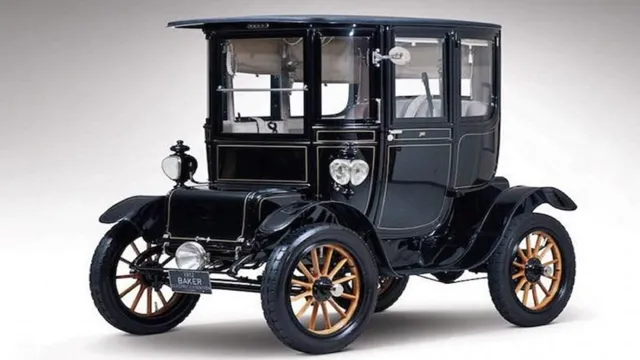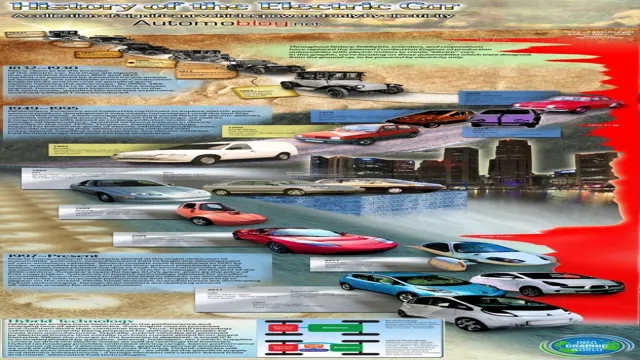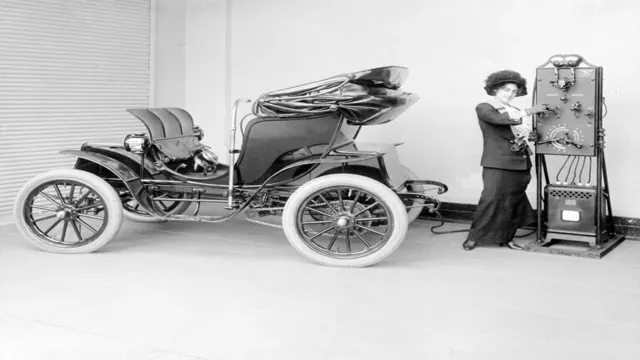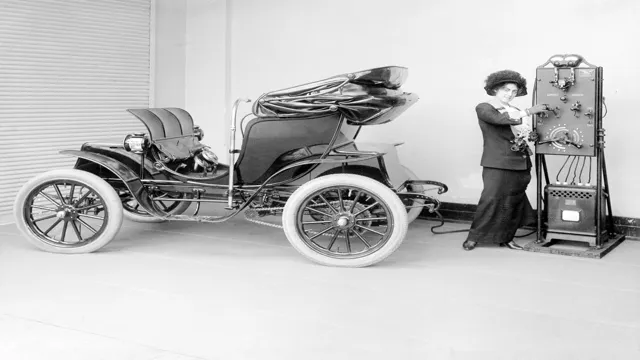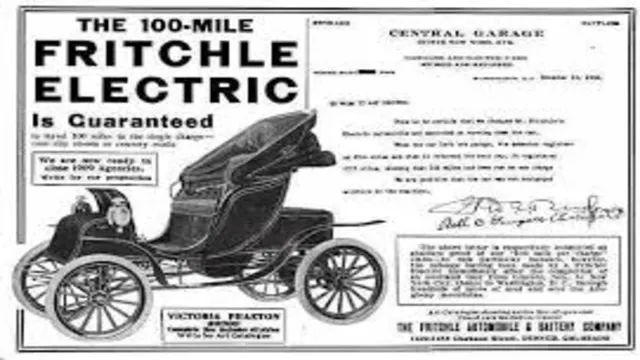Revolutionizing Transportation: Exploring the Background History of Electric Cars
Electric cars are all the rage nowadays, but did you know that this type of vehicle has been around for more than a century? That’s right! Electric cars have a fascinating background history that is worth exploring for anyone who is passionate about automobiles. This type of vehicle has evolved massively since its debut in the late 19th century, and today’s models are more efficient, practical, and eco-friendly than ever before. The story of electric cars begins in the 1830s, when inventors started experimenting with battery-powered vehicles.
However, it wasn’t until the late 1800s that the first practical electric cars were developed. These early models were popular among the wealthy elite as they were quieter, smoother, and easier to operate than their steam-powered or gas-powered counterparts. They were also perceived as being more environmentally friendly, which was a concern even back then.
Over the years, electric cars became more mainstream, with several manufacturers establishing themselves as leaders in the field. However, the rise of gasoline-powered cars and the discovery of oil deposits hindered the growth of electric cars. As a result, the production of electric cars declined rapidly, and gasoline-powered cars became the norm.
However, this trend is slowly changing as concerns over the environment and climate change have focused attention back to electric vehicles. Today, electric cars have come a long way since their humble beginnings, with many automakers investing heavily in research and development to create more efficient and reliable electric cars. Governments across the world are encouraging their citizens to switch to electric cars to reduce carbon emissions and improve air quality.
With the advancements in technology, we can expect electric cars to play a significant role in shaping the future of transportation.
Early Inventions
The history of electric cars and their invention dates back to the early 1800s. It all started with the discovery of electricity by Benjamin Franklin in 1752, which inspired inventors to experiment with its applications in various fields, including transportation. In 1828, Anyos Jedlik, a Hungarian inventor, created a small model car that ran on an electric motor, which paved the way for the first full-sized electric car built by Thomas Davenport in 183
However, it wasn’t until the late 1800s that electric cars became more popular and gained widespread recognition. French inventor, Gustave Trouvé, made significant contributions to the technology that made electric cars feasible, including the development of a rechargeable battery. By 1900, electric cars accounted for around a third of all cars on the roads in the US.
Despite the initial success of electric cars, their popularity declined rapidly with the introduction of the internal combustion engine and the mass production of gasoline vehicles. It wasn’t until the oil crisis of the 1970s that interest in electric cars shifted, leading to advancements and innovations that have brought us to the modern electric vehicles we know today.
Inventors and their Contributions
Early inventions have paved the way for modern society. Inventors like Johannes Gutenberg, who invented the printing press in the 15th century, revolutionized the way information was disseminated. The printing press allowed for the mass production of books, which previously could only be copied by hand.
Another significant invention was the steam engine, which was developed by James Watt in the late 18th century. The steam engine powered locomotives and allowed for faster transportation of goods and people. Benjamin Franklin is also known for his early contributions, including the lightning rod and bifocal glasses.
These inventions helped improve safety during thunderstorms and made it easier for people with poor eyesight to see. Without these early inventions, our modern world would look vastly different, and we owe a debt of gratitude to these innovative thinkers.
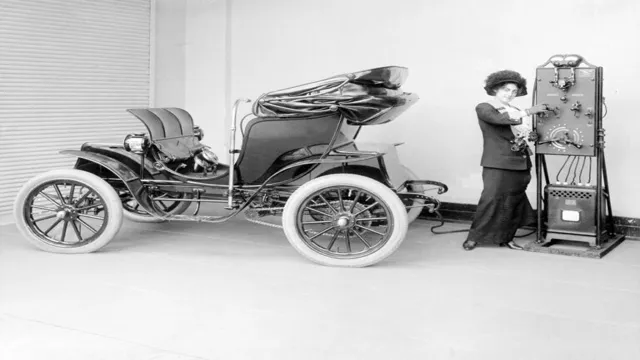
Emergence of Battery Technology
Battery Technology The emergence of battery technology has a long and storied history, with early inventions dating back to the 1800s. One of the pioneers of battery technology was Italian physicist, Alessandro Volta, who invented the first true battery in 1800. Volta used a stack of alternating zinc and copper discs separated by brine-soaked cardboard to generate an electrical current.
This invention paved the way for future innovations in battery technology by demonstrating the possibility of storing and utilizing electrical energy. Later, in the mid-1800s, John Frederic Dani developed the Daniell cell, which used a copper and zinc electrode in a solution of copper sulphate and zinc sulphate. This invention was the first battery with a constant output, enabling it to power telegraph networks and industrial equipment.
These early inventions laid the foundation for modern battery technology and set the stage for future advancements that would revolutionize the world of energy storage. Today, battery technology has become an essential component of modern life, powering everything from smartphones to electric cars, and promising a more sustainable future for generations to come.
21st Century Developments
The background history of electric cars dates back to the 19th century when electric vehicles were first invented. However, it wasn’t until the 21st century that we saw significant developments in this field. Thanks to advancements in battery technology, electric cars have become more efficient and affordable.
They are now comparable to traditional gas-powered cars in terms of range and performance. In recent years, the popularity of electric cars has surged as people become more environmentally conscious and as governments offer incentives for purchasing these vehicles. With the increasing demand for sustainable transportation solutions, it is likely that we will see even more advancements in electric vehicle technology in the coming years.
With these developments, the day when electric cars become the norm on our roads seems closer than ever before.
Tesla and the Rise of Electric Cars
Electric cars have truly come to life in the 21st century, and Tesla has been one of the most significant players leading this revolution. Their electric cars have been known for their sleek designs, impressive range, and powerful performance, making them a popular choice for many drivers. Tesla’s innovative technology has also allowed for significant advancements in self-driving capabilities and energy storage.
Moreover, the company has attracted a devoted fanbase and has even created a new culture and way of life around electric vehicles. The rise of electric cars has many benefits, including reducing the carbon footprint and improving air quality, but it also presents new challenges around infrastructure and accessibility. Nevertheless, Tesla, among others, has shown that the future of transportation is electric, and the possibilities are endless.
Environmental and Economic Impact
In the 21st century, there has been a growing concern for the impact of economic development on the environment. While economic growth is necessary for progress, we must also consider the long-term effects on our natural resources and ecosystems. One of the most significant developments in this regard is the push towards sustainable and green technologies.
These developments aim to reduce the ecological footprint of human activity while promoting economic growth. For example, renewable energy sources such as solar and wind power have become increasingly viable solutions for powering homes and businesses, leading to a reduction in reliance on fossil fuels. These advancements in technology not only benefit the environment but also create new job opportunities and stimulate economic growth in the long term.
With sustainable development as a priority, we can ensure that future generations can enjoy a healthy and thriving planet while maintaining economic growth.
Government Policies and Incentives
In recent years, there has been a significant increase in government policies and incentives to promote 21st-century developments. These policies aim to attract companies and entrepreneurs involved in innovative technologies such as artificial intelligence, blockchain, and renewable energy. Governments worldwide offer tax breaks, research grants, and other financial incentives to stimulate investments in these sectors.
Such initiatives have the potential to enhance economic growth, create new job opportunities, and improve living standards. Additionally, governments are also implementing policies to encourage digital transformation and improve infrastructure, such as high-speed internet and green energy channels. These changes can help make everyday life more efficient, cost-effective, and sustainable.
The 21st-century developments offer a promising vision of the future, where technology and society coevolve and pave the way for a better world.
Future of Electric Cars
Electric cars have been around since the late 1800s, with some of the first models being created in Scotland and the US. However, as the automotive industry grew and gasoline-powered vehicles became more popular, electric cars fell out of favor and were largely forgotten. It wasn’t until the 1990s when advancements in battery technology and environmental concerns reignited interest in electric cars.
Companies such as General Motors and Toyota began producing electric cars at a larger scale, but they were expensive and had limited range. However, as technology continued to improve, electric cars became more practical, and prices began to decrease. Today, electric cars are becoming more mainstream, with a growing number of models and options available to consumers.
With the global push towards a more sustainable future, it’s likely that electric cars will continue to grow in popularity and become a more common sight on our roads.
Advancements in Battery Technology
Electric cars have gained popularity in recent years due to advancements in battery technology. One of the biggest challenges faced by electric car manufacturers is the limited driving range offered by batteries. However, recent advancements in battery technology have shown promising results in extending the driving range of electric vehicles.
Lithium-ion batteries, currently used in most electric cars, are being replaced by solid-state batteries that offer greater energy density, longer lifespan, and increased safety. Moreover, companies are also investing in developing fast-charging technology that will enable electric cars to be charged in a matter of minutes rather than hours. With these advancements, the future of electric cars looks bright.
They offer a more sustainable and eco-friendly alternative to traditional gasoline-powered vehicles, and with their rapidly improving technology, they are becoming a viable and practical option for consumers.
Integration with Renewable Energy Sources
The integration of renewable energy sources into the electric car landscape is a defining moment for the future of transportation. As we seek ways to reduce our carbon footprint, renewable energy sources such as solar and wind power will become essential in reducing our dependence on fossil fuels. Electric cars can act as a catalyst for this change, serving as a clean and efficient way to power our travels.
The process of integrating these energy sources is still in its early stages, but progress is being made every day. With advancements in technology and an increased focus on sustainability, we can expect to see a future where electric cars are the norm, powered by clean and renewable energy sources, and contributing to a greener and more sustainable world.
Conclusion
In conclusion, the story of electric cars is one of resilience and innovation. From early experiments in the 1800s, to the brief rise and fall of electric cars in the early 20th century, to today’s current revival of the electric vehicle, the history of electric cars is a testament to human ingenuity and our enduring desire to create a more sustainable future. So whether you’re cruising down the highway in a sleek Tesla or zipping around the city on a zippy little e-scooter, you can tip your hat to the pioneers of electric mobility who blazed a trail for all of us to follow.
After all, as the old saying goes, the best way to predict the future is to invent it.”
FAQs
What is the history of electric cars?
Electric cars were first introduced in the 1830s, but it wasn’t until the late 1990s that they began to be mass-produced. The first practical electric car was developed by Thomas Davenport in 1835.
When did electric cars become popular?
Electric cars became popular in the late 1990s, thanks in part to the introduction of the Toyota Prius in 1997. This hybrid car helped to revolutionize the automobile industry and paved the way for a new generation of electric cars.
How do electric cars work?
Electric cars are powered by electricity stored in batteries. When you charge an electric car, you are essentially charging its battery. The battery provides power to an electric motor, which turns the wheels of the car.
What are the benefits of electric cars?
Electric cars offer several benefits over traditional gasoline-powered cars, including lower emissions, better fuel efficiency, and lower maintenance costs. They are also much quieter and smoother to drive.
